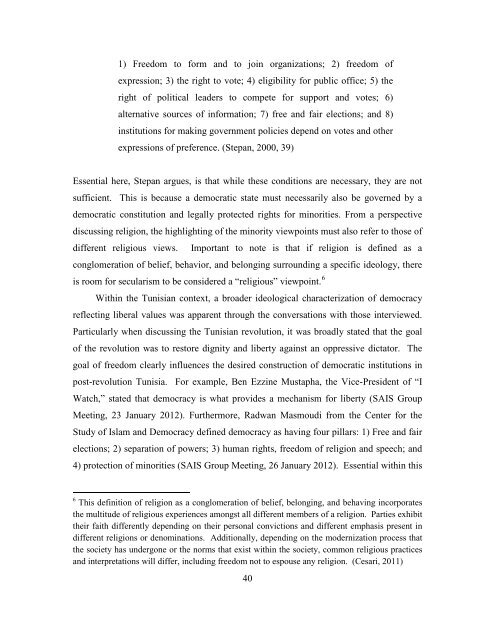Tunisia: Understanding Conflict 2012 - Johns Hopkins School of ...
Tunisia: Understanding Conflict 2012 - Johns Hopkins School of ...
Tunisia: Understanding Conflict 2012 - Johns Hopkins School of ...
Create successful ePaper yourself
Turn your PDF publications into a flip-book with our unique Google optimized e-Paper software.
1) Freedom to form and to join organizations; 2) freedom <strong>of</strong><br />
expression; 3) the right to vote; 4) eligibility for public <strong>of</strong>fice; 5) the<br />
right <strong>of</strong> political leaders to compete for support and votes; 6)<br />
alternative sources <strong>of</strong> information; 7) free and fair elections; and 8)<br />
institutions for making government policies depend on votes and other<br />
expressions <strong>of</strong> preference. (Stepan, 2000, 39)<br />
Essential here, Stepan argues, is that while these conditions are necessary, they are not<br />
sufficient. This is because a democratic state must necessarily also be governed by a<br />
democratic constitution and legally protected rights for minorities. From a perspective<br />
discussing religion, the highlighting <strong>of</strong> the minority viewpoints must also refer to those <strong>of</strong><br />
different religious views. Important to note is that if religion is defined as a<br />
conglomeration <strong>of</strong> belief, behavior, and belonging surrounding a specific ideology, there<br />
is room for secularism to be considered a “religious” viewpoint. 6<br />
Within the <strong>Tunisia</strong>n context, a broader ideological characterization <strong>of</strong> democracy<br />
reflecting liberal values was apparent through the conversations with those interviewed.<br />
Particularly when discussing the <strong>Tunisia</strong>n revolution, it was broadly stated that the goal<br />
<strong>of</strong> the revolution was to restore dignity and liberty against an oppressive dictator. The<br />
goal <strong>of</strong> freedom clearly influences the desired construction <strong>of</strong> democratic institutions in<br />
post-revolution <strong>Tunisia</strong>. For example, Ben Ezzine Mustapha, the Vice-President <strong>of</strong> “I<br />
Watch,” stated that democracy is what provides a mechanism for liberty (SAIS Group<br />
Meeting, 23 January <strong>2012</strong>). Furthermore, Radwan Masmoudi from the Center for the<br />
Study <strong>of</strong> Islam and Democracy defined democracy as having four pillars: 1) Free and fair<br />
elections; 2) separation <strong>of</strong> powers; 3) human rights, freedom <strong>of</strong> religion and speech; and<br />
4) protection <strong>of</strong> minorities (SAIS Group Meeting, 26 January <strong>2012</strong>). Essential within this<br />
6 This definition <strong>of</strong> religion as a conglomeration <strong>of</strong> belief, belonging, and behaving incorporates<br />
the multitude <strong>of</strong> religious experiences amongst all different members <strong>of</strong> a religion. Parties exhibit<br />
their faith differently depending on their personal convictions and different emphasis present in<br />
different religions or denominations. Additionally, depending on the modernization process that<br />
the society has undergone or the norms that exist within the society, common religious practices<br />
and interpretations will differ, including freedom not to espouse any religion. (Cesari, 2011)<br />
40
















